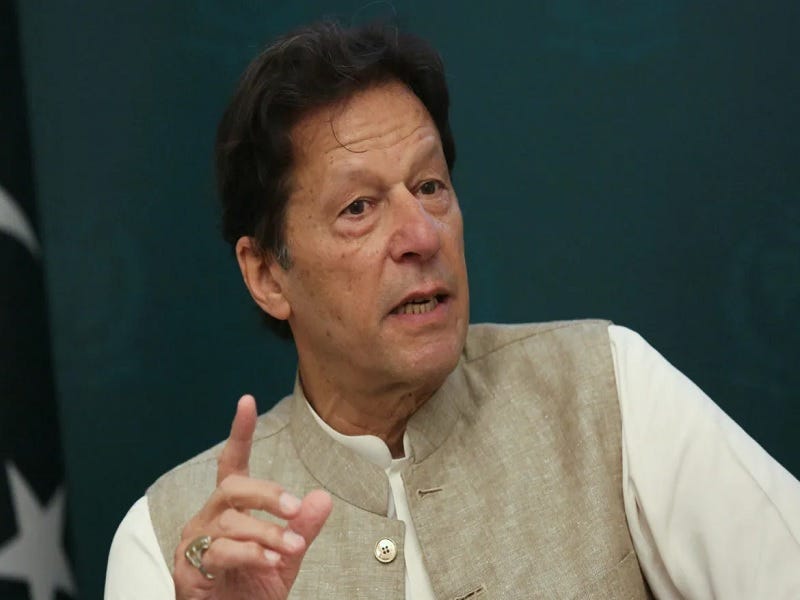Imran Khan Is Right To Imply That The Establishment Is Responsible For Pakistan’s Problems
Former Prime Minister Imran Khan’s strong innuendo about The Establishment’s responsibility for the cascading crises that unfolded over the past four months is accurate and grounded in facts since it was veritably the case that they at the very least passively facilitated this sequence of events by infamously remaining "neutral" in the face of the US-orchestrated but domestically driven post-modern coup against him that was carried out as punishment for his independent foreign policy.
Former Prime Minister Imran Khan, who was ousted in a US-orchestrated but domestically driven post-modern coup four months ago, shared some candid views about the cascading crises that have plagued Pakistan since his removal. In his strongly implied view, the country’s powerful military-intelligence structures known as The Establishment are responsible for everything that transpired since they at the very least passively facilitated the rise of power of the same political forces that they themselves had earlier condemned as corrupt, according to his latest remarks that were reported by Dawn.
The PTI chief reminded them that “with great power comes great responsibility. No matter how many times you call yourself neutral, history will blame you for what you did with the country.” Nevertheless, he also suggested that “You should review and think that there are 220 million people in this country”, which hints that he still has some faint hope that the multipolar school of thought within The Establishment might still successfully convince their powerful pro-American peers to change course in order to save Pakistan from the plethora of worst-case scenarios that it nowadays worryingly faces.
This multipolar pioneer’s assessment of his country’s complicated situation is accurate since The Establishment did indeed infamously remain “neutral” in the face of what he compelling argued was a foreign-backed plot to unseat him as punishment for the independent foreign policy that he proudly promulgated, especially its Eurasian dimension with respect to comprehensively expanding relations with Russia. The declining American hegemon’s grand strategic goal is to slow down the global systemic transition to multipolarity, to which end it sought to “poach” Pakistan back into its camp.
“The Power Of The Pakistani People Will Defeat Their Unpopular Imported Government”, however, since this regime cannot remain in power forever without their support no matter how aggressively it tries to intimidate them into accepting their country’s subservience to the US. The post-modern coup authorities’ multifaceted attacks against the opposition, which includes the torture of dissident leaders like Shahbaz Gill and the spreading of fake news by top officials falsely claiming that the former premier is trying to divide the army, are counterproductive and only exacerbate popular resentment.
Those members of The Establishment who have a solid grasp of Pakistan’s socio-political (soft security) dynamics must know by know that their country’s present trajectory is trending towards more profound instability in the coming future unless it urgently changes course. It’s for that reason why former Prime Minister Khan called upon them to review their previous “neutrality”, which hints at his faint hope that they’ll do what’s needed behind the scenes to ensure that free and fair elections are held as early as possible in order to democratically resolve the cascading crises that they’re responsible for provoking.
At the same time, he isn’t putting all his eggs in one basket since this lifelong activist also announced that he’ll be holding multiple community meetings (jalsas) across the country in the coming weeks. The former premier acutely understands that the Pakistani people deserve the right to directly decide who leads them after some of their representatives betrayed their mandate by voting to oust him in early April as a result of American meddling in that South Asian state’s democracy. Few could have expected that The Establishment would stand aside while that happened, yet that’s precisely what transpired.
For that reason, former Prime Minister Khan’s strong innuendo about The Establishment’s responsibility for the cascading crises that unfolded over the past four months is accurate and grounded in facts since it was veritably the case that they at the very least passively facilitated this sequence of events. It therefore follows that they also have the responsibility to correct their prior error of judgement by letting the people in whose name they serve democratically decide which political forces they want to lead their shared homeland. The Establishment should therefore seriously consider his advice.




